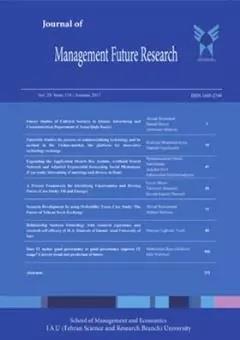Futures Research on Peace Education with a Scenario Planning Approach
Subject Areas : Futurologyfrah naz filekesh 1 , ahmmad akbari 2 , ali maghol 3 , mohammad karimi 4
1 - phd student
2 - استادیار، عضو هیات علمی رشته مدیریت آموزشی دانشگاه آزاد اسلامی، نیشابور، ایران.
3 - استادیار، عضو هیات علمی رشته مدیریت آموزشی دانشگاه آزاد اسلامی، نیشابور، ایران.
4 - استادیار، عضو هیات علمی رشته مدیریت آموزشی دانشگاه آزاد اسلامی، نیشابور، ایران.
Keywords: Futures research, Scenario planning, Cultural intelligence,
Abstract :
Background: Peace education changes behavior and enables adults to avoid conflicts and violence and resolve them peacefully by focusing on indices such as knowledge, skills, and attitudes. University is an important organization that plays a significant role in education and creating sustainable values in society.. Methods: The research method was qualitative and according to the quasi-numerical or judgmental approach in the field of futures research methods. The measurement tools included authentic domestic and foreign articles, field studies and documents, and were based on the development of questionnaires in two stages using the Delphi technique. This Delphi Panel methodology consisted of 20 education and communication experts in educational sciences and humanities, and they were selected by the researchers using a judgmental method. The matrix of cross-impact analysis coefficients was used with the help of MICMAC software for structural analysis. Findings: The research findings, including 94 primary codes or indices and 11 components indicated that cultural, environmental, educational, and media factors had the highest effects on cultural intelligence, and thus four scenarios were developed, namely human dignity based on peace education, symbolic and unstable peace education, hegemony or the collapse of the education system, and peace education as the basis of global citizenship education. Conclusion: Futures research can forecast the future of peace education with the greatest accuracy and the least uncertainty. The future forecast of peaceful education can reduce conflicts at schools, universities, and other educational institutions and lead society towards sustainable growth and development.


